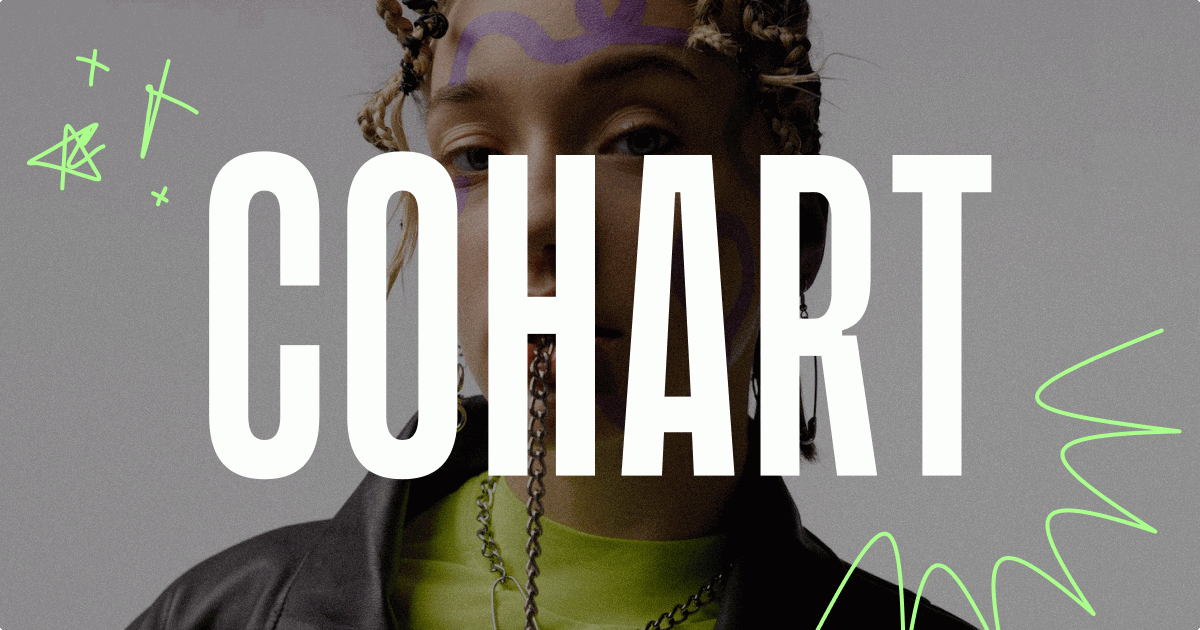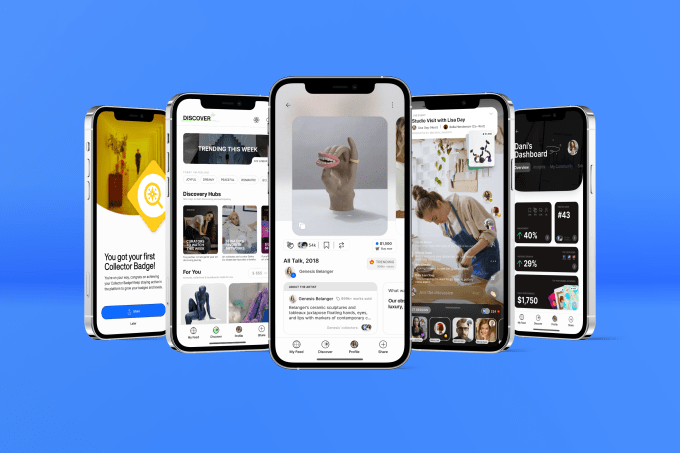How Canvas helped Cohart build a data-centric, low-ego culture
The following is transcribed from an interview with Kendall Warson, Founder and CEO of Cohart.
What is Cohart?
Cohart is a platform that connects artists, fans, and collectors to discover art that they love. The problem is that only about 14% of artists have gallery representation. So, the other 86% are mainly using Instagram as a tool to not only sell their art but also manage their brand, business, and community.
We’ve seen all these other vertical marketplaces unbundling eBay, Facebook, and Instagram across fitness spaces and communities like NextDoor. We had an inkling that the same thing could exist in the art market.
We incorporated in February 2021 with the idea of building a marketplace with a SaaS-heavy toolkit for artists on the backend where they could manage their community, their business, and their data all in one place.
We started going through the process of designing the product, and we talked to many consumers, like you and me, who are middle-aged millennials looking for art but don't know where to go.
We realized there's no discovery experience on the market native to next-generation consumer behaviors. So, we started building a social and personalized experience that enabled you to find art, showcase your collections, resell them, and manage them all in one place.
We're still early stage but have done a little under 2 million in sales since we launched an MVP and a Beta and raised an institutional seed round last summer. We’re still a tiny team with too much work and insufficient resources, which was the impetus for getting started with Canvas.
What were you doing from an analytics perspective before Canvas?
We use Amplitude for mobile tracking, Firebase for web tracking, MailChimp, QuickBooks, and HubSpot. We also conduct surveys with our users, both quantitative and qualitative, very frequently.
Our data tracking has always been decentralized. We would spend hours plugging it into spreadsheets to understand where the funnels are and where the patterns are, building our own analyses of what the data was telling us.
That whole process of plugging things in and putting everything in one place was super time-intensive and mostly only done when we were gearing up for a raise. Outside of that, the data was spread thin across many platforms.

What were your goals, and why did you choose Canvas?
The most important thing was that we hadn't seen all the information in one place, and as a founder, your time is everything. You're fighting this clock of a looming runway, trying to meet crazy KPIs, and don’t have much focus time.
Product doesn’t have a lot of resources, and you have to be hyper-efficient. So, for us, seeing everything in one place and building funnels where we could track what we're doing on mobile versus on the web versus in our marketing and see how that story syncs up and how the numbers all relate to each other was a huge unlock.
Now that we have more time, we're able to run more efficient experiments and work more effectively as a team because we're able to see, okay, what is it that we're doing in marketing that's affecting product and what do we need to introduce in the product that's going to improve the marketing experience and the messaging.
It's helped us collaborate more with a shared data source we all understand. None of us are data scientists. Having that be a shared language was a huge unlock as a team.
There are a lot of complicated tools on the market. We just got set up on Hubspot and don't need 85% of the features. We just need this one deal system. And so when you adopt a new SaaS tool, it's like the whole kitchen sink is thrown at you.
We're a tiny team, and many of them are not tailored for the stage you're at as a company. Canvas did a hands-on onboarding, helped us track events, built dashboards, and produced tailored, custom views for us.
That's all we need. We reduced the noise. It didn't introduce noise. It’s built for startups. The Canvas team comes from the startup ecosystem, and you know what it's like to be in this stage with limited resources and not have a million bells and whistles.
That's just made it a much more effective and efficient solution for us and fits what we need at this stage.
Who is using Canvas? What are they using it for?
Our leadership team uses it to track OKRs and all our weekly, monthly, and quarterly objectives.
We also use it for all of our investor reporting now, which has saved me a lot of time putting together dashboards and reports.
We use it on the product side to track our funnels.
Marketing uses it to understand what social experiments work and what types of partnerships drive impact.
This year, we're looking at doing a bunch of experiments on our monetization channels, seeing what has the most impact with the least effort, and trying to understand how our internal effort impacts our larger goals. It's crystal clear when we can all see it together and discuss it as a team.

What outcomes have you seen?
The positives have been that we can see the data in one place. And so, for us, a big unlock was understanding that 75% of our users are coming from the web versus mobile. We used to just track like web and mobile and silos.
One of our core goals this year is getting parity between web and mobile, which wouldn't have been a priority a few months back. So that's a good example.
We also have glaring things that we need to work on. Our revenue is super choppy month by month, and being able to see that and have a lot of different visualizations of it and understand what that looks like from a bunch of other visual angles has been something that we know is another core focus for 2024.
Visualizing the business objectives and seeing how that affects the product roadmap and the prioritization is what you're doing every day as a founder, but you can just do it much more efficiently when you have this view.
Why should someone reading this take action on their data problems instead of waiting?
The minute you have one user, data is important. As a founder, you are always building stories about what you think will be important or impactful or have a business impact.
And the reality is the data is the guiding light. Your intuition is super important as a founder, but contrasting your intuition against what the data tells you enables you to make more informed business decisions and move much faster. It also helps your team get on the same page, see things objectively, and celebrate things when you start to see numbers moving and connecting the dots between different teams working together on the same objective through different channels.
It creates a better culture and helps everyone feel less egocentric or like someone just deciding what to do. And it makes it much more transparent, communicative, and motivating to work on something that’s already so difficult.
Is there anything else surprising or worth noting about Canvas?
The tailored onboarding experience is a huge unlock for startups at our stage. We don't have data scientists on our team, so do you hire them or build or work with a new SaaS tool? And it always feels like it's a massive gap between those two decisions, and Canvas was this perfect in between where it was like, okay, we were able to, and it enabled us to have this team help us get started with a lot of work that we didn't have time to do.
It enabled us to make data a priority. We would have kept deprioritizing it if we didn't have that level of high-touch experience. And the fact that it was so tailored to our needs and collaborative makes it a helpful product that we now need.
For startups in our stage, everyone should be using it because you can have data be something that your team starts to care about really early on. It becomes foundational to your team culture, which will continue to scale as you succeed.
Where can people learn more about Cohart?
You can go to cohart.com. Download our beta for iOS and Android. So we'd love to hear your thoughts,
